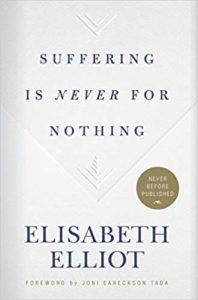Two of my favorite books from this summer are my current “must read” recommendations.

When she died on June 15, 2015 after suffering from the effects of dementia for years, part of my sadness was the realization that there would be no more additions to her theological oeuvre.
I was delighted this summer to see a new book from Elisabeth Elliot, an adaption of a series of talks she gave on suffering. Suffering is Never for Nothing starts with an insightful definition: “Suffering is having what you don’t want or wanting what you don’t have.” And, she invites us to learn from suffering because she believed “the deepest things that I have learned in my own life have come from the deepest suffering.”
The book outlines four themes she believes should guide our understanding of and response to suffering: acceptance, gratitude, offering and transfiguration. They are not easy truths but they are steeped in scripture and explored through decades of her experiences with deep suffering.

This perceptive book encourages the reader to consider how to respond with empathy to someone who is suffering. The Rabbit Listened tells the story of a little child who experiences a small difficulty, a creation of building blocks that is destroyed by flock of birds, but it feels very hard and sad. Lots of animals try to help, assuming they know the right response. Finally, the rabbit comes by, and upon seeing the mess, stops, sits down close to the hurting child and listens.
The story reminds me of Job’s friends who when they found Job after learning of the devasting loss of his children and property, “began to weep aloud, and they tore their robes and sprinkled dust on their heads. Then they sat on the ground with him for seven days and seven nights. No one said a word to him, because they saw how great his suffering was” (Job 2:12–13).
All is well,
Lisa

